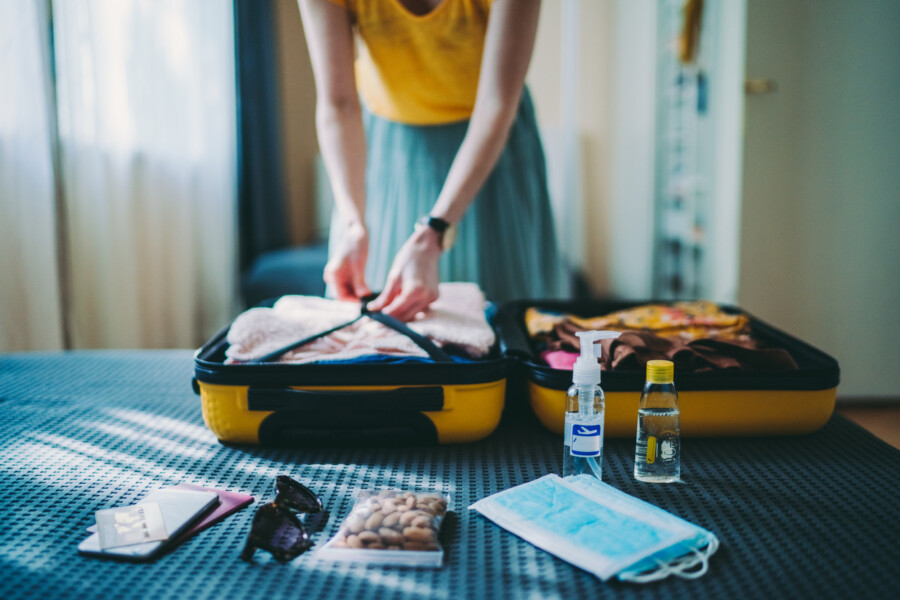Traveling Safely with Varicose Veins During COVID-19

The CDC recommends you stay home this holiday season. But if you must travel, follow these tips to protect your vein health — and to avoid contracting COVID-19.
The Centers for Disease Control and Prevention advise against traveling this holiday season due to the COVID-19 pandemic. However, it may be necessary for you to take a trip this year. If you do so, please follow the guidelines outlined by the CDC regarding precautions, such as quarantining before and after you arrive at your destination, testing as necessary and appropriate, and wearing personal protective equipment while traveling.
If you also have varicose veins, you’ll need to take additional safeguards when traveling. By protecting your veins and guarding against infection, you’ll enjoy a happy, healthy holiday season.
Traveling Safely with Varicose Veins
Minimizing the discomfort of varicose veins while you travel comes down to following some simple rules of the road. Varicose veins develop when blood flow stalls due to weak valves that allow blood to collect in the veins, ultimately leading to bulging ropes of veins on the legs. Therefore, any measures you can take to boost circulation helps counteract that breakdown in proper blood movement, especially when traveling involves sitting for a significant period of time. Here are four tips for traveling safely with varicose veins:
Get Up From Your Seat. Blood flow tends to slow when you’re seated for hours on a plane or train or in a car. But you can stimulate your circulation by getting up from your seat and moving around as much as possible. During a car trip, make frequent stops to take a brief stroll. On a plane or train, walk up and down the aisle — making sure to keep socially distant from other passengers whenever possible. If you don’t feel comfortable moving about the cabin, you can flex your ankles or stretch out your legs to encourage proper blood flow.
Give Yourself Some Room. Although airlines have started filling the middle seat, try to book a seat where you may not be seated too closely to another passenger. Not only will this protect you from the virus, you’ll also have enough room to stretch your legs. You should also make sure to always wear your mask during the flight.
Sip Water. Airplane ventilation systems sap the moisture in the air. To replace that lost moisture and keep your veins from tightening and restricting blood flow, sip water to prevent dehydration, preferably eight ounces every two hours. Conversely, avoid caffeine and alcoholic beverages, as those will contribute to sluggish circulation and promote dehydration.
Wear Your Compression Stockings. If you already have varicose veins, you’re no doubt familiar with tight elastic garments. Wearing them supports blood flow, thereby easing the pain and swelling of varicose veins. Though it’s important to wear them regularly, it’s even more vital when you’re on a long trip, as you’re less active and don’t have a chance to exercise your calf muscles to support circulation. Depending upon the severity of your varicose veins, you can buy a pair in a drugstore or ask your doctor for a prescription for a higher pressure grade.
An added bonus of following these tips is that each prevents the onset of a deep vein thrombosis (DVT), a blood clot in the leg due to thickened, slow-moving blood. DVT is a potentially serious complication if the clot breaks free and travels to the lungs.
The safest way to avoid an infection this year is to cancel any travel plans. Yet if you absolutely must travel, follow the CDC guidelines to reduce your risk of contracting COVID-19. And if you do decide to travel and have varicose veins, take these extra precautions to ensure a pleasant, pain-free trip.
Don’t Neglect Your Vein Health
Center for Vein Restoration remains open to take care of your vein needs. Whether you’re considering a surgical procedure to rid yourself of your varicose veins, or just want guidance on how to better manage uncomfortable symptoms, our specialists are here to help you. Contact us today for an appointment.